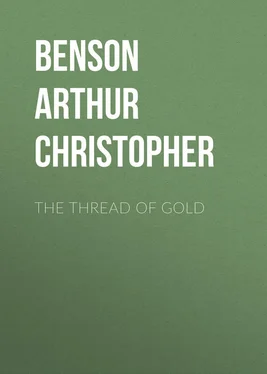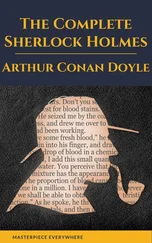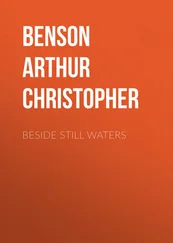Arthur Christopher Benson - The Thread of Gold
Здесь есть возможность читать онлайн «Arthur Christopher Benson - The Thread of Gold» — ознакомительный отрывок электронной книги совершенно бесплатно, а после прочтения отрывка купить полную версию. В некоторых случаях можно слушать аудио, скачать через торрент в формате fb2 и присутствует краткое содержание. ISBN: , Жанр: foreign_antique, foreign_prose, на английском языке. Описание произведения, (предисловие) а так же отзывы посетителей доступны на портале библиотеки ЛибКат.
- Название:The Thread of Gold
- Автор:
- Жанр:
- Год:неизвестен
- ISBN:http://www.gutenberg.org/ebooks/30326
- Рейтинг книги:3 / 5. Голосов: 1
-
Избранное:Добавить в избранное
- Отзывы:
-
Ваша оценка:
- 60
- 1
- 2
- 3
- 4
- 5
The Thread of Gold: краткое содержание, описание и аннотация
Предлагаем к чтению аннотацию, описание, краткое содержание или предисловие (зависит от того, что написал сам автор книги «The Thread of Gold»). Если вы не нашли необходимую информацию о книге — напишите в комментариях, мы постараемся отыскать её.
The Thread of Gold — читать онлайн ознакомительный отрывок
Ниже представлен текст книги, разбитый по страницам. Система сохранения места последней прочитанной страницы, позволяет с удобством читать онлайн бесплатно книгу «The Thread of Gold», без необходимости каждый раз заново искать на чём Вы остановились. Поставьте закладку, и сможете в любой момент перейти на страницу, на которой закончили чтение.
Интервал:
Закладка:
A stone's throw away lay a large square moat, full of water, all fringed with ancient gnarled trees; the island which it enclosed was overgrown with tiny thickets of dishevelled box-trees, and huge sprawling laurels; we walked softly round it, and there was our goal: a small church of a whitish stone, in the middle of a little close of old sycamores in stiff summer leaf.
It stood so remote, so quietly holy, so ancient, that I could think of nothing but the "old febel chapel" of the Morte d'Arthur . It had, I know not why, the mysterious air of romance all about it. It seemed to sit, musing upon what had been and what should be, smilingly guarding some tender secret for the pure-hearted, full of the peace the world cannot give.
Within it was cool and dark, and had an ancient holy smell; it was furnished sparely with seat and screen, and held monuments of old knights and ladies, sleeping peacefully side by side, heads pillowed on hands, looking out with quiet eyes, as though content to wait.
Upon the island in the moat, we learned, had stood once a flourishing manor, but through what sad vicissitudes it had fallen into dust I care not. Enough that peaceful lives had been lived there; children had been born, had played on the moat-edge, had passed away to bear children of their own, had returned with love in their hearts for the old house. From the house to the church children had been borne for baptism; merry wedding processions had gone to and fro, happy Christmas groups had hurried backwards and forwards; and the slow funeral pomp had passed thither, under the beating of the slow bell, bearing one that should not return.
Something of the love and life and sorrow of the good days passed into my mind, and I gave a tender thought to men and women whom I had never known, who had tasted of life, and of joyful things that have an end; and who now know the secret of the dark house to which we all are bound.
When we at last rose unwillingly to go, the sun was setting, and flamed red and brave through the gnarled trunks of the little wood; the mist crept over the pasture, and far away the lights of the lonely farm began to wink through the gathering dark.
But I had seen! Something of the joy of the two sweet places had settled in my mind; and now, in fretful, weary, wakeful hours, it is good to think of the clear wells that sparkle so patiently in the dark wood; and, better still, to wander in mind about the moat and the little silent church; and to wonder what it all means; what the love is that creeps over the soul at the sight of these places, so full of a remote and delicate beauty; and whether the hunger of the heart for peace and permanence, which visits us so often in our short and difficult pilgrimage, has a counterpart in the land that is very far off.
VII
The Cuckoo
I have been much haunted, indeed infested, if the word may be pardoned, by cuckoos lately. When I was a child, acute though my observation of birds and beasts and natural things was, I do not recollect that I ever saw a cuckoo, though I often tried to stalk one by the ear, following the sweet siren melody, as it dropped into the expectant silence from a hedgerow tree; and I remember to have heard the notes of two, that seemed to answer each other, draw closer each time they called.
But of late I have become familiar with the silvery grey body and the gliding flight; and this year I have been almost dogged by them. One flew beside me, as I rode the other day, for nearly a quarter of a mile along a hedgerow, taking short gliding flights, and settling till I came up; I could see his shimmering wings and his long barred tail. I dismounted at last, and he let me watch him for a long time, noting his small active head, his decent sober coat. Then, when he thought I had seen enough, he gave one rich bell-like call, with the full force of his soft throat, and floated off.
He seemed loath to leave me. But what word or gift, I thought, did he bring with him, false and pretty bird? Do I too desire that others should hatch my eggs, content with flute-like notes of pleasure?
And yet how strange and marvellous a thing this instinct is; that one bird, by an absolute and unvarying instinct, should forego the dear business of nesting and feeding, and should take shrewd advantage of the labours of other birds! It cannot be a deliberately reasoned or calculated thing; at least we say that it cannot; and yet not Darwin and all his followers have brought us any nearer to the method by which such an instinct is developed and trained, till it has become an absolute law of the tribe; making it as natural a thing for the cuckoo to search for a built nest, and to cast away its foundling egg there, as it is for other birds to welcome and feed the intruder. It seems so satanically clever a thing to do; such a strange fantastic whim of the Creator to take thought in originating it! It is this whimsicality, the bizarre humour in Nature, that puzzles me more than anything in the world, because it seems like the sport of a child with odd inconsequent fancies, and with omnipotence behind it all the time. It seems strange enough to think of the laws that govern the breeding, nesting, and nurture of birds at all, especially when one considers all the accidents that so often make the toil futile, like the stealing of eggs by other birds, and the predatory incursions of foes. One would expect a law, framed by omnipotence, to be invariable, not hampered by all kinds of difficulties that omnipotence, one might have thought, could have provided against. And then comes this further strange variation in the law, in the case of this single family of birds, and the mystery thickens and deepens. And stranger than all is the existence of the questioning and unsatisfied human spirit, that observes these things and classifies them, and that yet gets no nearer to the solution of the huge, fantastic, patient plan! To make a law, as the Creator seems to have done; and then to make a hundred other laws that seem to make the first law inoperative; to play this gigantic game century after century; and then to put into the hearts of our inquisitive race the desire to discover what it is all about; and to leave the desire unsatisfied. What a labyrinthine mystery! Depth beyond depth, and circle beyond circle!
It is a dark and bewildering region that thus opens to the view. But one conclusion is to beware of seeming certainties, to keep the windows of the mind open to the light; not to be over-anxious about the little part we have to play in the great pageant, but to advance, step by step, in utter trustfulness.
Perhaps that is your message to me, graceful bird, with the rich joyful note! With what a thrill, too, do you bring back to me the brightness of old forgotten springs, the childish rapture at the sweet tunable cry! Then, in those far-off days, it was but the herald of the glowing summer days, the time of play and flowers and scents. But now the soft note, it seems, opens a door into the formless and uneasy world of speculation, of questions that have no answer, convincing me of ignorance and doubt, bidding me beat in vain against the bars that hem me in. Why should I crave thus for certainty, for strength? Answer me, happy bird! Nay, you guard your secret. Softer and more distant sound the sweet notes, warning me to rest and believe, telling me to wait and hope.
But one further thought! One is expected, by people of conventional and orthodox minds, to base one's conceptions of God on the writings of frail and fallible men, and to accept their slender and eager testimony to the occurrence of abnormal events as the best revelation of God that the world contains. And all the while we disregard his own patient writing upon the wall. Every day and every hour we are confronted with strange marvels, which we dismiss from our minds because, God forgive us, we call them natural; and yet they take us back, by a ladder of immeasurable antiquity, to ages before man had emerged from a savage state. Centuries before our rude forefathers had learned even to scratch a few hillocks into earthworks, while they lived a brutish life, herding in dens and caves, the cuckoo, with her traditions faultlessly defined, was paying her annual visits, fluting about the forest glades, and searching for nests into which to intrude her speckled egg. The patient witness of God! She is as direct a revelation of the Creator's mind, could we but interpret the mystery of her instincts, as Augustine himself with his scheme of salvation logically defined. Each of these missions, whether of bird or man, a wonder and a marvel! But do we not tend to accept the eager and childish hopes of humanity, arrayed with blithe certainty, as a nearer evidence of the mind of God than the bird that at his bidding pursues her annual quest, unaffected by our hasty conclusions, unmoved by our glorified visions? I have sometimes thought that Christ probably spoke more than is recorded about the observation of Nature; the hearts of those that heard him were so set on temporal ends and human applications, that they had not perhaps leisure or capacity to recollect aught but those few scattered words, that seem to speak of a deep love for and insight into the things of earth. They remembered better that Christ blasted a fig-tree for doing what the Father bade the poor plant do, than his tender dwelling upon grasses and lilies, sparrow and sheep. The withering of the tree made an allegory: while the love of flowers and streams was to those simple hearts perhaps an unaccountable, almost an eccentric thing. But had Christ drawn human breath in our bleaker Northern air, he would have perhaps, if those that surrounded him had had leisure and grace to listen, drawn as grave and comforting a soul-music from our homely cuckoo, with her punctual obedience, her unquestioning faith, as he did from the birds and flowers of the hot hillsides, the pastoral valleys of Palestine. I am sure he would have loved the cuckoo, and forgiven her her heartless customs. Those that sing so delicately would not have leisure and courage to make their music so soft and sweet, if they had not a hard heart to turn to the sorrows of the world.
Читать дальшеИнтервал:
Закладка:
Похожие книги на «The Thread of Gold»
Представляем Вашему вниманию похожие книги на «The Thread of Gold» списком для выбора. Мы отобрали схожую по названию и смыслу литературу в надежде предоставить читателям больше вариантов отыскать новые, интересные, ещё непрочитанные произведения.
Обсуждение, отзывы о книге «The Thread of Gold» и просто собственные мнения читателей. Оставьте ваши комментарии, напишите, что Вы думаете о произведении, его смысле или главных героях. Укажите что конкретно понравилось, а что нет, и почему Вы так считаете.












